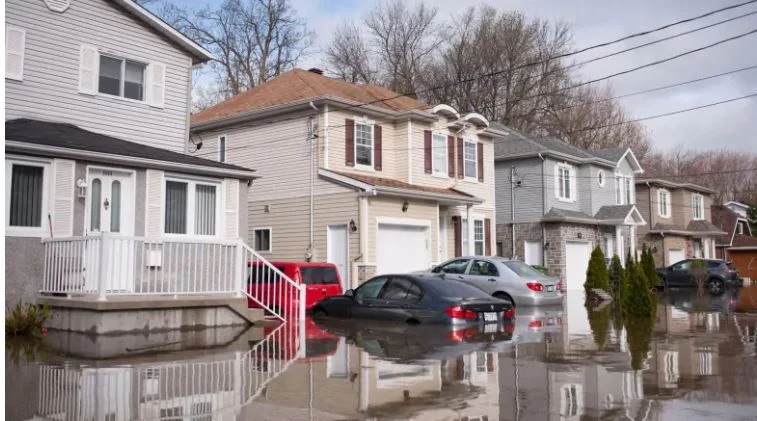As severe flash flooding and severe water damage become a rising risk in Canada, coverage and broker talking points are evolving to address the intensity and frequency of extreme weather. Spring thaw is creating opportunities for drainage backups and property damage due to yo-yoing temperatures and unpredictable precipitation. According to Jim Mandeville, senior vice president, large loss at First Onsite Property Restoration, “insurance policies are evolving with changing climate concerns, which is something brokers should emphasize to clients who may be vulnerable.” Mandeville has years of experience working in the disaster relief sector, being on the front lines of restoration and mitigation projects across North America including Hurricane Sandy, the Slave Lake wildfires of 2011 and the Fort McMurray flooding of 2013, to name a few.
How Metro Vancouver is earthquake-proofing its water reservoirs in preparation for the 'Big One'
Nearly six metres below a South Delta residential area, workers are making upgrades to a water storage reservoir that holds millions of litres of drinking water. Work at the Pebble Hill reservoir began in the fall of 2021 to prepare for natural disasters in the future. Metro Vancouver has been steadily upgrading its reservoirs since the '90s to ensure it can provide water to the region following the "Big One" — a megathrust earthquake expected to hit the B.C. coast someday.
Why mitigation matters amid US$100 billion plus cat losses
Last year’s catastrophe losses pose a stark reminder of the need to build resilience and educate people about risk mitigation and insurance, according to Aon executives. Global insured losses from natural disasters and climate events topped US$100 billion (CAN$134 billion) for third year in a row, according to a new report by global broking giant Aon. The 2023 weather, climate and catastrophe insight report revealed that natural disasters caused US$313 billion in economic losses globally in 2022, 4% above the 21st-century average.
Province Accepting Water, Wastewater And Other Green Infrastructure Project Applications Until November 29
Today, Saskatchewan communities and eligible organizations may start submitting funding applications for proposed water, wastewater and other projects under the last intake in the province for the Investing in Canada Infrastructure Program (ICIP). “We encourage applicants to provide their project submissions as early as they are able to so communities can put shovels in the ground as soon as possible," Government Relations Minister Don McMorris said. “Our provincial government will continue to invest in infrastructure to create jobs, position communities for growth and continue to build a stronger Saskatchewan.”
Canada and British Columbia invest $29.5 million in 11 projects to make B.C. communities more resilient to natural disasters
Today, the Honourable Dominic LeBlanc, Minister of Intergovernmental Affairs, Infrastructure and Communities, and the Honourable Mike Farnworth, British Columbia’s Minister of Public Safety and Solicitor General, announced more than $29.5 million in joint funding to reduce and mitigate the risk of floods and slide events in 11 communities across B.C. These projects are in addition to 18 other disaster mitigation-related projects that were announced last summer.
UBC experts on flooding and extreme weather
UBC experts are available to comment on flooding and extreme weather, in light of a state of emergency in Kelowna and other parts of western Canada. Climate science and natural disasters Dr. Susan Day Professor, Department of Forest Resources Management Email: susan.day@ubc.ca Phone: 604-822-6652 Interview Language(s): English: Urban forests, Urban soils, stormwater, water relations, plant response to climate stress to climate stress
B.C. residents urged to prepare for floods and wildfire
British Columbians are asked to prepare for natural disasters ahead of this year’s spring freshet and wildfire season. B.C. government officials said there are a number of steps you can take to make sure you are ready in the event of a disaster. “As we’ve seen in recent years, from wildfires to floods, many households in the province are uninsured or underinsured for the hazards we face in British Columbia, which are becoming more frequent due to climate change,” said Mike Farnworth, Minister of Public Safety and Solicitor General. Provincial government officials recommend purchasing flood and fire insurance to ensure you have some financial protection.
Insurance isn't enough: Governments need to do better on natural disaster resilience
The massive floods in British Columbia in November 2021 demonstrated the devastation that natural disasters can cause in Canada. Prior to 2010, it was rare for annual insured losses from natural disasters in Canada to exceed $1 billion, but now insured losses of $3 billion are not uncommon. Canada is expected to become wetter, stormier, warmer and to experience more severe connective storms and wildfires. The Insurance Institute of Canada forecasts that annual insured losses could increase to $5 billion within the next 10 years.
IN PHOTOS: 12 notable Canadian stories in 2021
On Oct. 12, due to concerns about fuel contamination, Iqaluit issued a do-not-consume order for its tap water that lasted nearly two months. The city of 8,000 would eventually point to an underground fuel spill as the potential cause of the contamination. After learning that the city's water was not safe to drink, residents in Iqaluit collected water from the nearby Sylvia Grinnell River. The military was dispatched to help provide treated water from the river using mobile water treatment units.
'It's a problem for society': Climate change is making some homes uninsurable
As an insurer, Intact obviously has its own data and maps. Based on that, the company assumes as many as five per cent of those newly at-risk properties will be simply uninsurable. Brindamour warns that "if you're in a zone that gets flooded repeatedly, or where the odds of being flooded has increased meaningfully, it'll be hard to find insurance from private capital."











